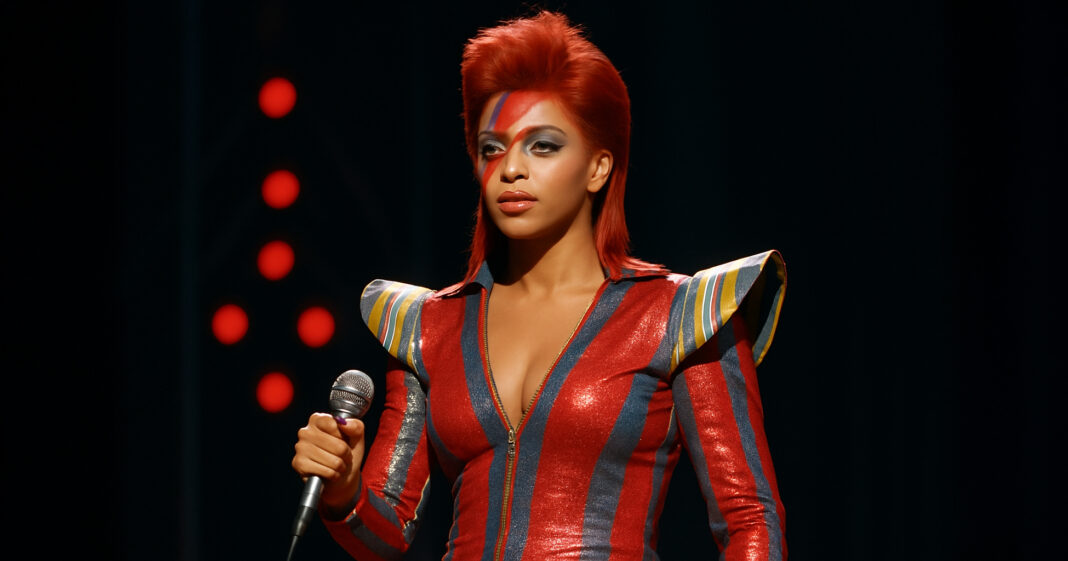Los Angeles, CA — Just when the dust was settling, or perhaps merely migrating, from Beyoncé’s audacious two-step onto the hallowed ground of country music, the other boot has dropped, landing squarely in the glittery, ambiguous terrain of David Bowie.
The announcement came not with a whimper, nor even the expected corporate press release jargon, but with a declaration, bold and clear as a lightning bolt painted across the sky: Beyoncé Knowles-Carter intends to reinterpret the entire David Bowie catalog, from the Tin Machine years right back to the Laughing Gnome, presumably because she can.
And the Bowie Estate, far from barricading the vaults or issuing cease-and-desist orders woven from Ziggy Stardust’s actual hair, has apparently thrown open the doors, cheering her on. An official statement, dripping with what cynics might call ‘opportunistic synergy’ but which the Estate termed ‘artistic solidarity,’ welcomed the project, praising Beyoncé’s “visionary approach to cultural dialogue” and her “unflinching commitment to exploring the multifaceted nature of iconic artistry.”
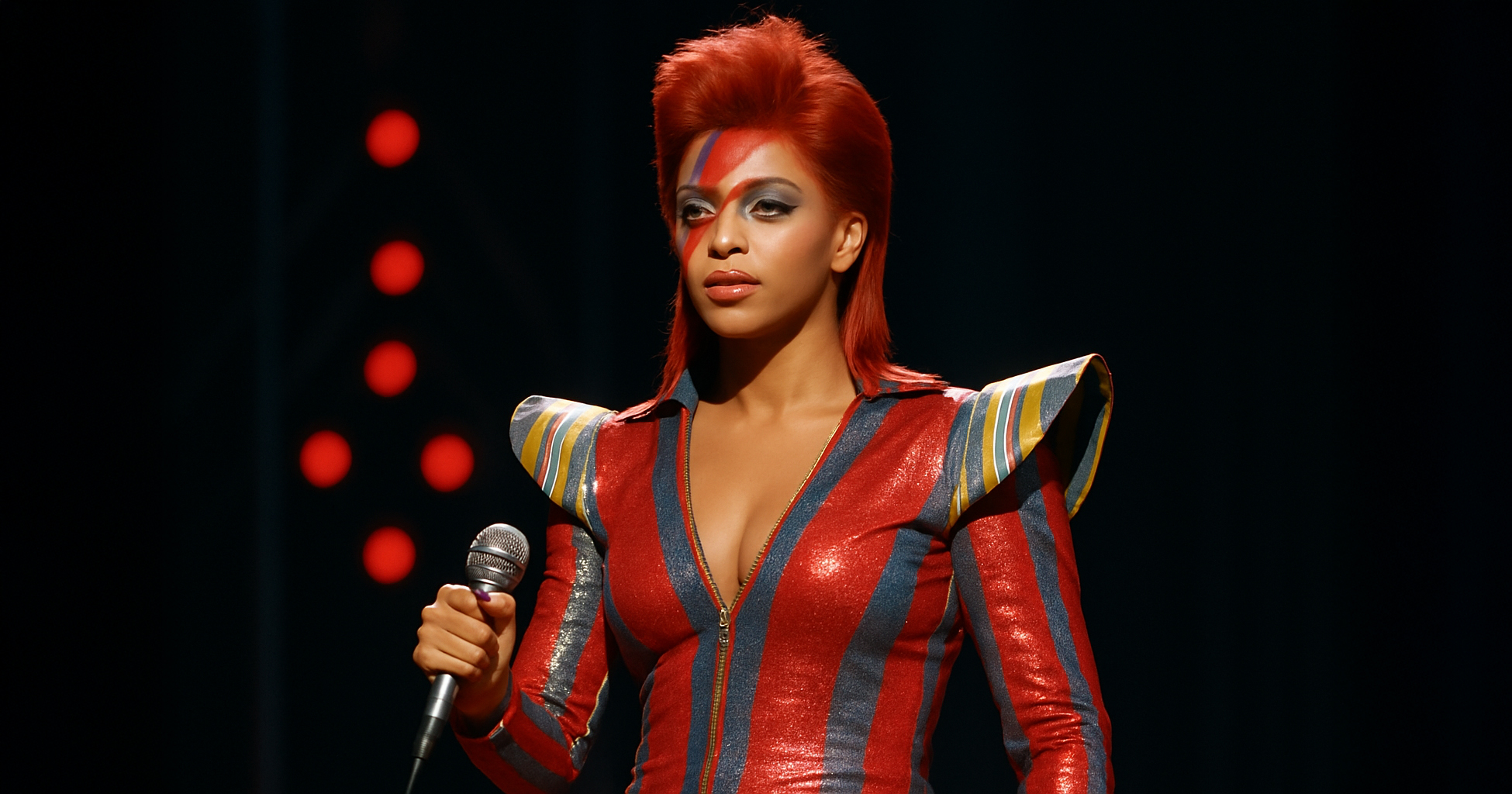
One imagines old David himself, perhaps reclining on a cloud shaped vaguely like Brixton, nodding along with bemused approval, or maybe just asking Iggy Pop if he left the iron on back in Berlin.
But, as the earth spins and the tides pull, so too does predictable outrage follow unwelcome genius. Reports flooded in almost immediately, not from critics this time, oh no, but from the self-appointed guardians of the Bowie flame, men mostly, men whose youth seemed hermetically sealed within the shrink-wrap of a 1972 RCA vinyl pressing, men who felt this news deep in their marrow, like a betrayal.
Social media platforms, those digital confessionals for the perpetually aggrieved, lit up with anguish. One user, posting under the handle @ZiggyStardustsGhostWriter, lamented, “It’s not about race, it’s about authenticity,” his words typed, one imagines, with trembling fingers, the screen illuminated only by the cold glow of his monitor and the flickering embers of his long-lost teenage rebellion.
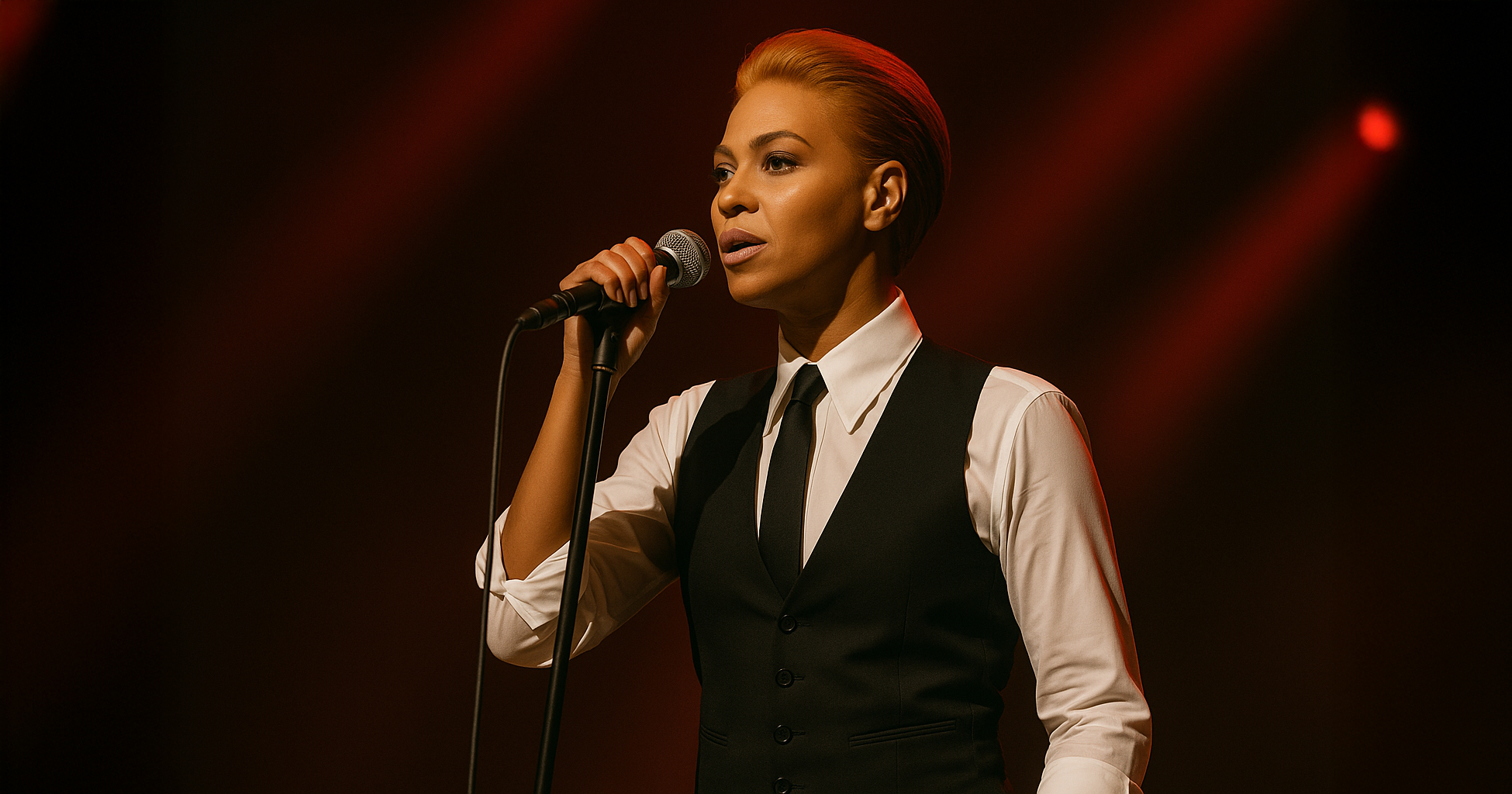
Another, a gentleman named Gary from Dayton, Ohio, whose profile picture showed him proudly wearing a Station to Station t-shirt that seemed, much like Gary himself, to have surrendered to time and gravity, confessed something profound in its naked vulnerability: “I feel… personally attacked by her excellence. It’s too much. Why can’t she just be okay? Why does she have to be transcendent? It makes my own carefully curated record collection feel… inadequate.”
To further stoke the flames of passionate outrage and gleeful support, music critics and former Bowie collaborators quickly weighed in. Tony Visconti was humorously imagined to say, “Beyoncé doing Bowie? Well, I never saw it coming, but then again, neither did Ziggy Stardust.” Brian Eno reportedly offered his ethereal approval, tweeting, “She might actually reinvent ‘ambient glam-rock’. We’re entering a brave new sonic dimension.”
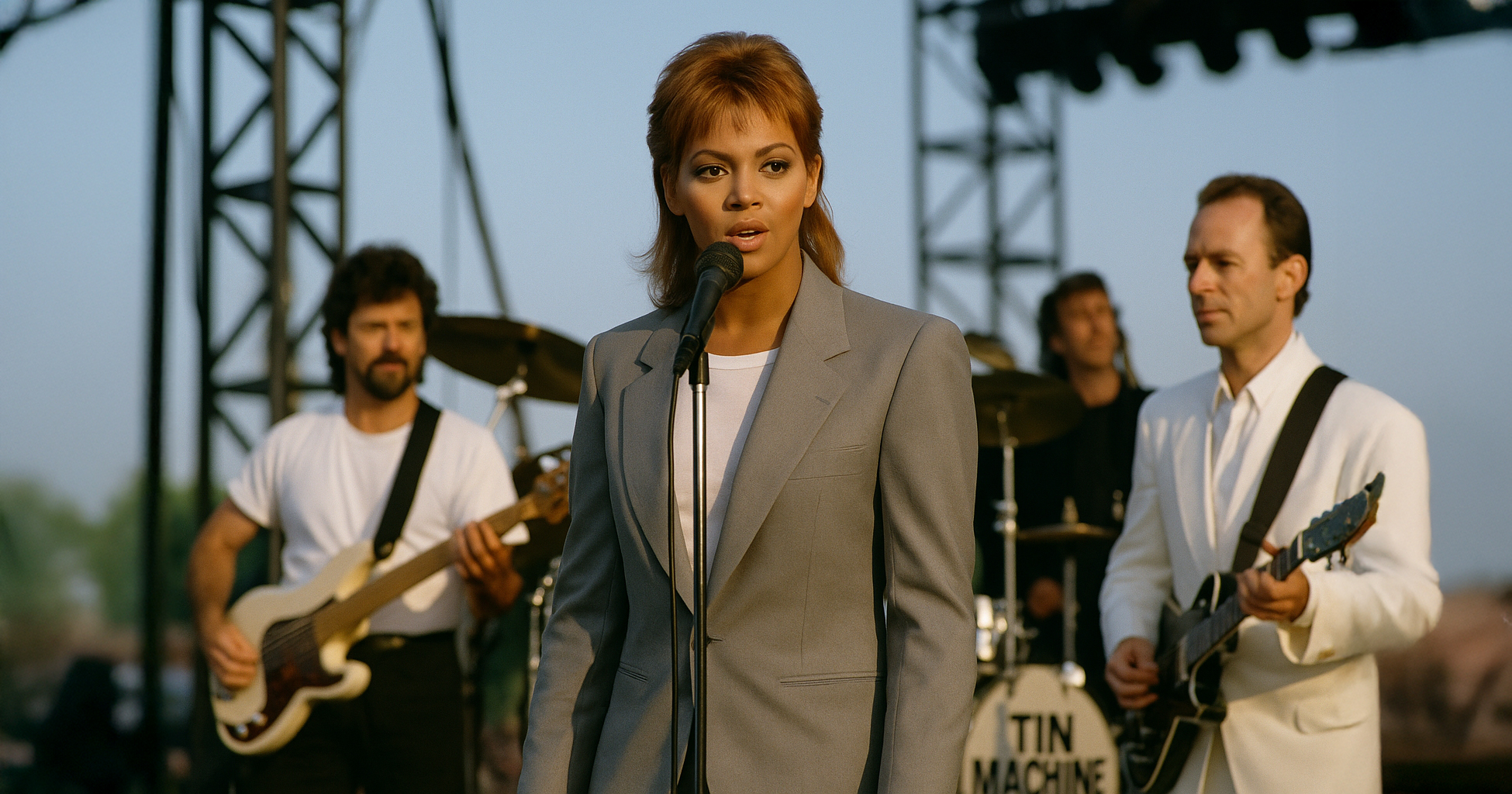
In the meantime, online speculation about the reinterpretation of individual songs became its own cultural event. Fans wondered aloud if “Space Oddity” would be transformed into a soulful Houston gospel spiritual, or if “Heroes” would be reinvented as an energetic, line-dancing anthem. A viral tweet from @MajorTomHouston joked, “Just wait until she drops ‘Life on Mars?’ with a 14-minute Jay-Z verse on interstellar investments. #QueenBowie #BowieBeyondBeyoncé.”
The speculative frenzy spilled into absurd corporate partnerships and merchandise tie-ins. Whispers emerged of a glitter-based makeup line dubbed “Bey-Bowie Stardust,” glam-infused cowboy boots titled “Diamond Dogs Deluxe,” and a limited-edition “Aladdin Sane” jewelry set guaranteed to make your bank account feel like “The Man Who Sold the World.”
And isn’t that the crux of it, the little pearl of truth hidden in the oyster of their discontent? It wasn’t just that someone new was singing the sacred songs, no, it was that she might sing them well, perhaps too well, shining a light so bright it revealed the dust motes dancing on their own cherished memories. They were like men watching a polished, powerful new locomotive roar past their own beloved, sputtering steam engine; they admired the craftsmanship, perhaps, but resented its effortless speed, its sheer, unadulterated power making their own treasured machine seem quaint, slow, a relic burdened by the rust of unexamined devotion.
Beyoncé herself, naturally, remains poised above the fray, a serene enigma wrapped in sequins and perceived market dominance. Rumors swirl about the approach – will “Space Oddity” become a Houston gospel spiritual? Will “Heroes” be reimagined as a line-dancing anthem? Will “The Man Who Sold the World” feature a Jay-Z verse discussing diversified asset portfolios? The speculation itself seems part of the performance art, another layer peeled back, revealing only more questions beneath.
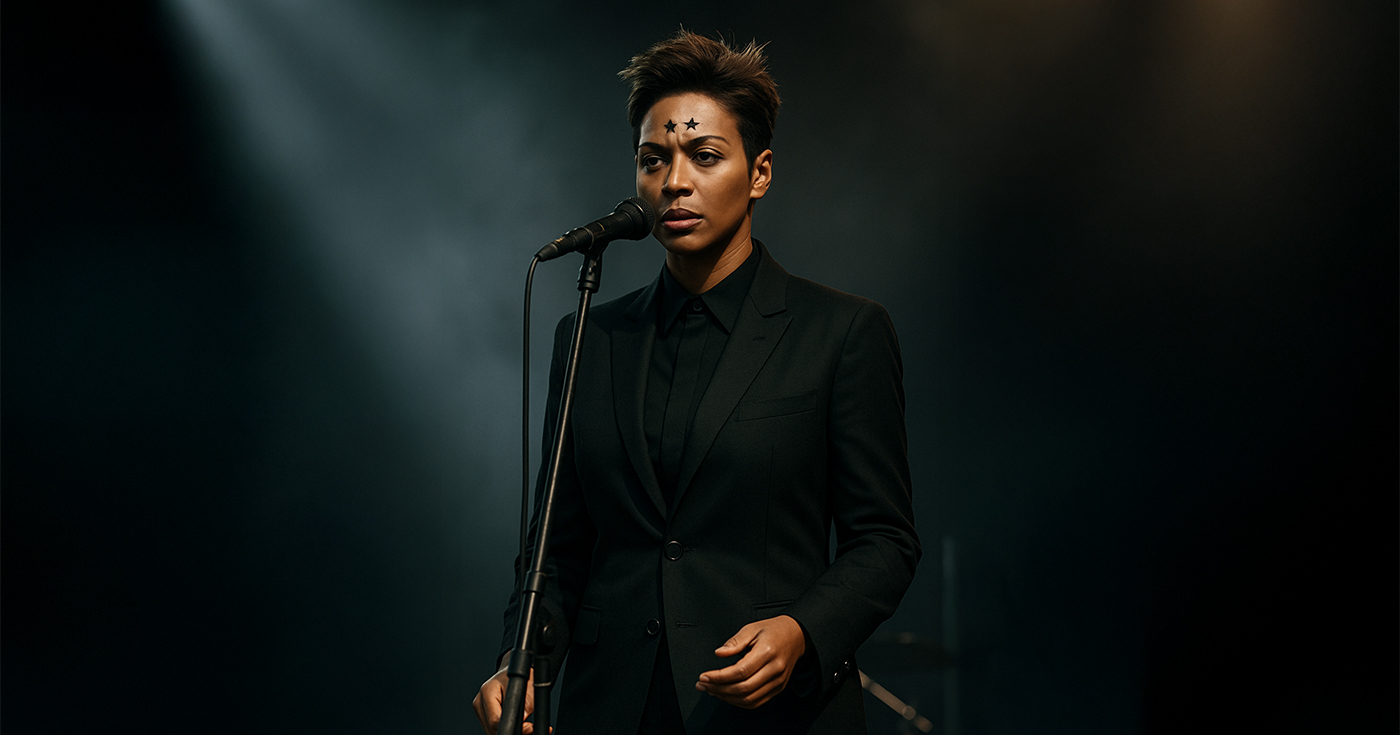
So here we stand, at the crossroads of pop spectacle and rock mythology, watching a cultural icon rework the tapestry of another, while the faithful weep, not tears of joy, but of a strange, bewildering pain – the agony of witnessing something magnificent they feel, somehow, they are unworthy of, or worse, excluded from by its very brilliance.
It’s a peculiar kind of torment, this feeling of being personally attacked by excellence, a very modern affliction for souls clinging tightly to the shores of the past as the tide of the future, glittering and relentless, washes in.

